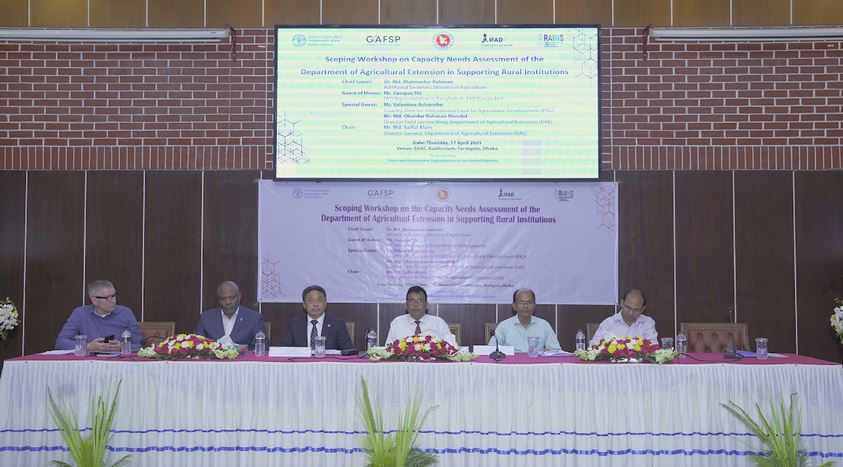News Flash
News Flash

DHAKA, April 17, 2025 (BSS) – The Food and Agriculture Organization (FAO) of the United Nations has reaffirmed its commitment to working with the government to strengthen the country’s agricultural extension system and to support a more efficient, inclusive, resilient, and sustainable agri-food system.
“We reaffirmed FAO’s commitment to working with the government of Bangladesh to strengthen the country’s agricultural extension system and to support a more efficient, inclusive, resilient, and sustainable agri-food system—ensuring better production, better nutrition, a better environment, and a better life, leaving no one behind,” said FAO Representative in Bangladesh Dr Jiaoqun Shi while speaking at the closing session of a workshop here today.
“For farmers to adopt climate-smart technologies and access markets effectively, extension systems must be responsive, inclusive, and equipped with the right tools,” he added.
The FAO organized the scoping workshop under the ‘Diversified Resilient Agriculture for Improved Food and Nutrition Security’ (RAINS) Project to initiate a structured capacity needs assessment of the Department of Agricultural Extension (DAE).
The workshop, held at the Bangladesh Agricultural Research Council (BARC) Auditorium in the city, marked an important step toward making Bangladesh’s agricultural extension services more inclusive, responsive, and better equipped to meet the evolving needs of rural communities, said a press release here.
FAO has been providing technical assistance to DAE and the Department of Agricultural Marketing (DAM) through the RAINS Project to help build a more resilient and inclusive agricultural support system.
The scoping workshop laid the groundwork for identifying DAE’s capacity needs—ensuring that future services are aligned with the challenges and realities faced by farmers and rural organizations.
The workshop commenced with a welcome address by Dr Muhammad Emdadul Haque, Project Director, SACP-RAINS. Martijn van de Groep, Senior Technical Advisor at FAO, introduced the objectives of the workshop, emphasising the importance of participatory planning and systems thinking in strengthening institutional support for rural development.
Participants engaged in technical sessions aligned with the workshop’s objectives. Key themes included challenges in extension methods, skills development for extension officers, quality extension services, digital tools and infrastructure, feedback mechanisms, and transparency in extension service delivery.
The closing session was also addressed by Dr Valantine Achancho, Country Director of the International Fund for Agricultural Development (IFAD), and Md Obaidur Rahman Mondol, Director of Field Services at DAE.
The event concluded with statements from Dr Md Mahmudur Rahman, Additional Secretary at the Ministry of Agriculture, who served as Chief Guest, and Md Saiful Alam, Director General of DAE, who chaired the workshop.
Dr. Md. Mahmudur Rahman, Additional Secretary at the Ministry of Agriculture stated, “The steps taken through the RAINS project for participatory extension activities, development of women and youth entrepreneurship and development of market-oriented agriculture have initiated a crucial change in the agriculture sector. Activities like evidence-based capacity development of DAE, training, and organization of multi-stakeholder roundtables will enhance the effectiveness of the extension system.”
Throughout the workshop, discussions focused on strengthening service delivery across the country. The outcomes will directly inform the development of a Capacity Development Plan and Strategic Paper for DAE.
This will guide future efforts to enhance agricultural extension and advisory services and better support rural institutions, contributing to long-term food and nutrition security in Bangladesh.
As a next step, FAO and DAE will jointly facilitate multistakeholder roundtables at upazila and district levels and divisional-level workshops to gather deeper field insights.